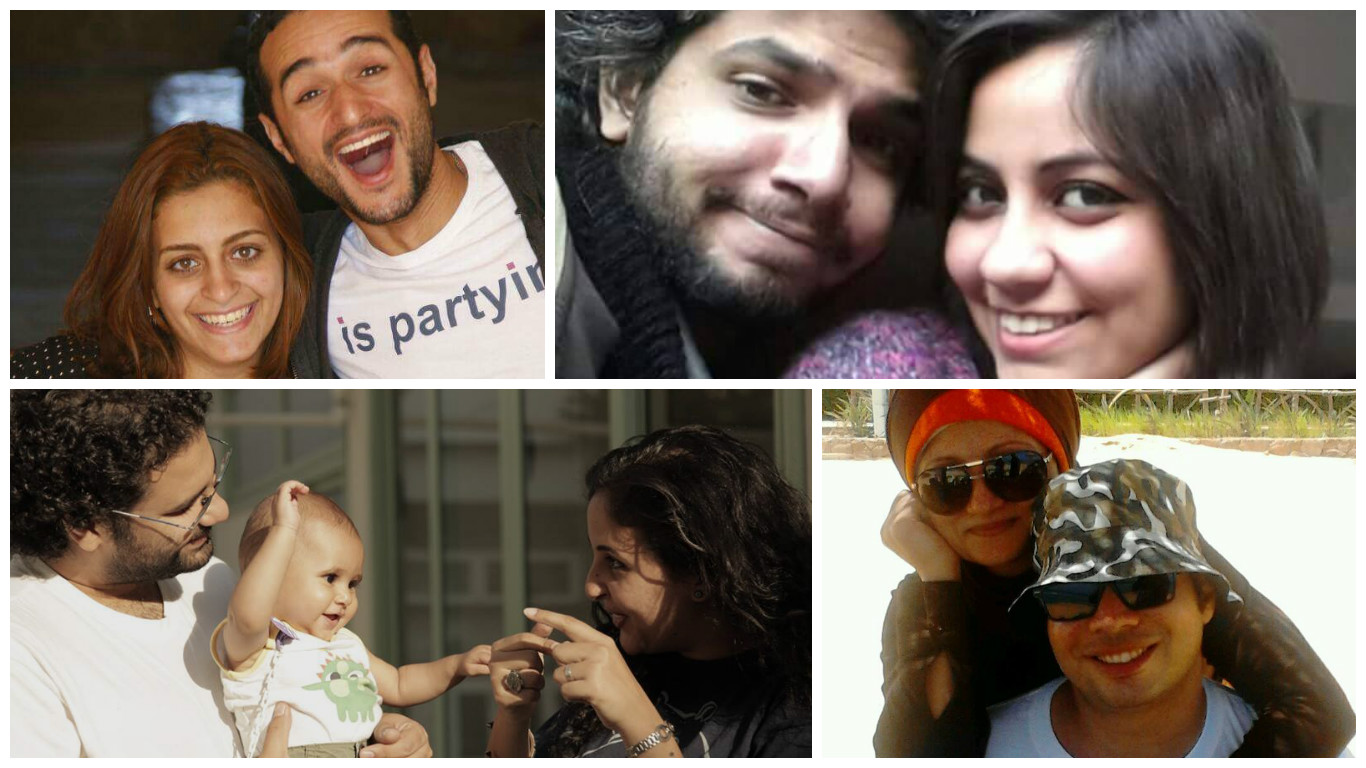Latest NEWS
- Aswat Masriya, the last word
- Roundup of Egypt's press headlines on March 15, 2017
- Roundup of Egypt's press headlines on March 14, 2017
- Former Egyptian President Hosni Mubarak to be released: lawyer
- Roundup of Egypt's press headlines on March 13, 2017
- Egypt's capital set to grow by half a million in 2017
- Egypt's wheat reserves to double with start of harvest -supply min
- Roundup of Egypt's press headlines on March 12, 2017
Between hope and the desolation of absence: The wives of Egyptian political detainees on Uprising anniversary

By Rahma Diaa
CAIRO, Jan. 25 (Aswat Masriya) - Their days are heavy, their lives have been put on hold, and their dreams, like their loved ones, are locked up. Detainees’ wives spend their days waiting for their loved ones’ freedom.
Nourhan Hefzy, Ahmed Douma's wife
For Nourhan Hefzy, the wife of Ahmed Douma, the fifth anniversary of the uprising is different from the anniversaries in the years before, because “the authorities have an understandable fear.”
Douma is a leading figure in the April 6 movement, which had played a role in garnering momentum for the 2011 Uprising that led Mubarak to step down five years ago.
He is currently facing life in prison, along with 268 others in the same case, for taking part in the “cabinet clashes” which took place in December 2011.
Hefzy is surprised by the security apparatus’ attacks “on those who belong to the revolution at a time when the constitution, the state, and its parliament claim that it was a popular revolution.”
“Unfortunately the 25th of January anniversary is treated as if it is a stain, or a criminal,” Hefzy said as she referenced security forces’ raids and inspections of 5,000 downtown apartment.
She also told Aswat Masirya of her husband’s feelings about the uprising’s anniversary.
To Douma, “the revolution is suffering a setback, and is being fought", but he is optimistic "like he usually is," she said. He believes "the situation will not continue like this for long."
Detained since December 2013, Douma started a hunger strike on Aug. 28, 2014 to protest his imprisonment. He suspended it on Sept. 30, 2014 due to stomach and duodenum ulcers, his wife previously said.
Douma’s condition in prison is unsettling. “His situation is bad, he is in solitary confinement,” his wife said adding that there is "under siege", as he is not allowed to get certain books in prison or read non-state newspapers.
Hefzy is annoyed by the supervision imposed on her and her husband during prison visits. “A [police] informant has to sit with us, and listen to every word being said, as if we were planning a large conspiracy, and this is the thing that upsets us most during visits. It really upsets Ahmed.”
The toughest thing that Hefzy and her husband had to go through was Douma’s sickness, for which he had to be transferred to Tora prison once. He suffered from severe sores and a stomach virus.
“That time was really really tough for me, and I do not think I will go through anything more difficult in my life,” Hefzy said. Yet she is still confident that “no matter how delayed people’s awareness of reality is, in the end they will realise.”
That is what we are hoping for, she added.
Reham Ibrahim, Ahmed Maher's wife
Some of Hefzy's perils are shared by Reham Ibrahim, the wife of Ahmed Maher. Maher is also one of the imprisoned co-founders of the April 6 movement. In December 2013, Maher was sentenced to three years in prison after being charged with violating the protest law in what is popularly known as the “Abdeen case.”
Commenting on her children’s conditions while their father is imprisoned, Ibrahim wrote on her facebook page: “A lot of stages in their lives have passed without him, Nedal always asks whether his father was with us at home for sometime… he can’t remember life before Ahmed’s imprisonment.”
As for Maher’s daughter, Miral, she is "too shy to speak to him during visits. She sits there quietly with a shy, sad smile and can’t respond to him when he speaks to her."
Manal Bahey El-Deen, Alaa Abdel Fattah's wife
Manal Bahey El-Deen said she gets the strength to endure the detention of her husband Alaa Abdel Fattah from their child, Khaled, who turned four last December.
Abdel Fattah, a well-known activist, was sentenced to five years in maximum security prison for violating the protest law, in what eventually came to be known as the "Shura Council trial" that dates back to November 2013.
Thousands of people have been detained on charges of breaking the controversial protest law, which outlaws protests that have not received prior approval from the Ministry of Interior.
Opponents of the law previously criticised it for "breaching basic rights stipulated in the constitution and contradicting what the Egyptian people have achieved in the wake of the January 25 Revolution."
Bahey El-Deen apologised to their son on facebook post for having to celebrate his birthday without his father.










